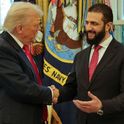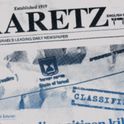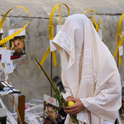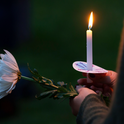At around 7.30pm on Tuesday evening, history repeated itself. Following weeks of Israeli strikes targeting Hezbollah in Lebanon, which peaked last week with the killing of Hassan Nasrallah, the leader of the Iran-backed Shia militia, rocket alert sirens sounded across the country as Iran launched more than 180 missiles at Israel.
As in April, when Iran fired a similar, though smaller, volley at the Jewish-majority state, Israelis hid in bomb shelters, safe rooms and stairwells. In Tel Aviv, in central Israel, video footage showed night skies bright with explosions. One Palestinian was reportedly killed by shrapnel in Jericho in the West Bank. In the city of Gedera, also in central Israel, a school, thankfully empty, was hit. But most of the barrage was intercepted.
Other dynamics repeated themselves from April. The US helped Israeli defences to shoot down the incoming missiles, and despite his many frustrations with the Israeli leadership over its bombardment of Gaza, Joe Biden was clear about where Washington’s allegiances lie. “Make no mistake,” he told reporters, “the United States is fully, fully, fully supportive of Israel.”
The question of whether all-out war will break out in the Middle East has hung over the region since 7th October. In recent weeks, analysts have once again been pondering Israel’s targeting of Hezbollah, Iran’s foremost proxy in the area. Since the pager explosions targeting Hezbollah members two weeks ago—which Israel has not officially taken responsibility for—the Israeli army has been enacting a decapitation exercise reportedly 18 years in the making. Hassan Nasrallah, Hezbollah’s long-time leader, was killed on Friday 27th September, and multiple members of the group’s leadership have died, too. Though weakened, it has continued firing rockets at Israel. On Tuesday morning, Israel launched a ground invasion of southern Lebanon billed by the US and Israel as a “limited” incursion.
Following Tuesday’s missile attack, Israel and Iran exchanged pleasantries: Israel vowed to retaliate; Iran vowed to retaliate if Israel retaliates. The attack itself was reminiscent of the one in April in that it seemed intended to send a message, rather than to spark the wider conflict that so many fear. “It's clear that Iran still wants to avoid war,” historian and Iran analyst Arash Azizi told me. “It was once more a choreographed attack, even if it used more advanced missiles. Again, Iran went out of its way to declare that it was only attacking military and non-civilian sites.” There were no Israeli casualties and few injuries, he added. “It was a desperate attempt by Iran to save some face as it was looking hapless following Israel's repeated operations”.
Since the pager explosions, and certainly since the assassination of Nasrallah, a hubris has dominated Israeli public discourse, amid what many see as a veritable triumph across the border—with a pride in Israeli intelligence and the army’s ability to kneecap a bitter enemy. For the prime minister Benjamin Netanyahu, who only recently was the victim of mass walkouts from his UN General Assembly speech—showing the extent to which Israel is now a global pariah—this was vindication of his career-long obsession with the Iranian threat, and his policy of ignoring the conflict with the Palestinians. It was also a distraction from his rejection of a Gaza truce deal, which has left dozens of Israeli hostages still in the Strip and the war ongoing. Netanyahu seems committed to his very personal, very political motivations for trying to postpone a resolution to the war until after the US election.
Though Iran has warned Israel that a response will bring consequences, Biden’s expression of “full, full, full” support implied that the US would support further Israeli action against Iran, a sentiment echoed by various other Republicans and Democrats. Remember that in July Israel assassinated Hamas leader Ismail Haniyeh on Iranian territory, the day after killing a senior Hezbollah commander in Beirut. Within Israel, following Tuesday's attack, there have been calls for Israel to target Iran’s nuclear facilities.
Still, US backing for a major retaliation is highly unlikely, said Alon Pinkas, a former consul general for Israel in New York. Such a move would "very likely drag the US into the conflict involuntarily. The greater the reprisal, the more probable the US’s involvement and that is absolutely NOT in the US’s interest." What Washington wants from Israel is "restraint", he added, especially so close to the US election. The US "wants Israel to agree to ceasefires in both Gaza and Lebanon, he added. "Neither will happen."
Hubris and fear can be a toxic, blinding mix. On Tuesday evening, in Jaffa, just south of Tel Aviv, mere minutes before Iran’s missile attack began, two Palestinian men from Hebron in the West Bank disembarked from a light-rail stop, carrying an assault rifle and a knife. They stabbed and shot people in the street, including a mother with a nine-month-old baby in a sling, who was among seven people killed. Her baby survived.
Since 7th October, Israel has doggedly pursued its years-long policy of deterrence. It’s targeting of Hezbollah in recent weeks has been more of the same “escalate to de-escalate” logic: hit hard and your enemies will leave you be. Iran, arguably, was doing the same yesterday evening. The problem is that peace is the least likely outcome of continued escalation, which will bring further brutalisation of innocent civilians, instability and fear. This approach also neglects the occupation of Palestinian territories and the ongoing conflict between Israelis and Palestinians. The families of Israeli hostages in Gaza face the waking nightmare of having been abandoned by their government.
On Wednesday morning, the eve of Jewish New Year, the violence continued. Hezbollah was firing rockets on northern Israel, and Israel was hitting Hezbollah in Lebanon. The many thousands who have fled their homes in south Lebanon, Beirut and northern Israel were still displaced. Across the region—in Lebanon, Gaza, the West Bank, and Israel—people once again grieved, and feared. And the world watched as the Middle East, on fire for almost a year, teetered on the edge of chaos.














